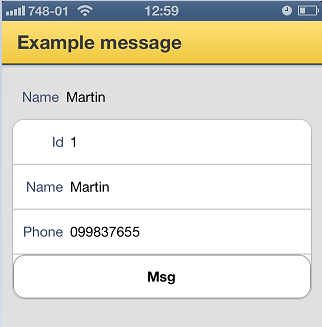To display warning messages.
Msg( {'msg' | &var} [, nowait | status ] )
Where:
msg
String containing the message to be displayed.
&var
Variable containing the message to be displayed.
nowait
Stores the message in an internal variable and processing continues. The user will not see the message until program processing ends. This improves program performance as less screen input/output is required.
For SD applications works as a "toast message".
status
The message is displayed at the moment when it is originated. It is useful for giving the user information about program processing status.
This message option degrades performance due to the required screen input/output.
It is used to display the literal, variable, or character expression contents in the message popup window (or message line, depending on the working environment). The moment when the user actually sees the message will depend on where the command is declared and on the option selected.
When using a variable, GeneXus controls, at specification time, that the variable type is Character.
When no option is Specified:
Web Panels and Transactions
Sends the message and waits for the Enter key to be pressed.
Procedures
See status option.
Smart Devices
The message command has no effect in Start, Refresh and Load events from a Smart Device application as it is considered a Client-side Events in Native Mobile Applications
Msg('Insert Data');
Msg(&Today);
Msg(Concat('B: Value' , B)); // Where B is Character type
Msg(Concat('Entered Date: ', DtoC(C))); // Where C is Date type.
Msg(Concat('Entered Date Hour', TtoC(D))); // Where and D is Datetime type.
Msg(&var, nowait) // Where &var is character type (you can see an example picture below where the msg button triggers the action).

Objects: Procedure object, Transaction object,Web Panel object ,Panel object,Work With pattern and Work With object
Msg rule
Client-side Events in Native Mobile Applications
Server-side Events in Native Mobile Applications